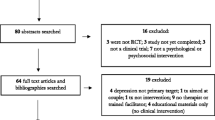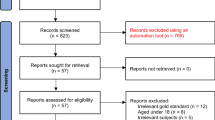Abstract
Scarce data exists regarding the prevalence of antenatal depression in hospitalized pregnant women, and its effect on perinatal outcome. We aimed to estimate the risk of maternal depression among women hospitalized in a high-risk pregnancy department, and to evaluate its potential association with adverse perinatal outcome. A depression screening self-questionnaire-based prospective study was performed, in which hospitalized pregnant women who screened positive for depression were compared to those who screened negative. The Edinburgh Postnatal Depression Scale (EPDS) was used for antenatal depression screening. Pregnancy course and perinatal outcome were compared between the groups. A multivariate logistic regression model was constructed to control for clinically relevant confounders. During the study period, 279 women met the inclusion criteria. Among them, 28.3% (n = 79) screened positive for depression (≥ 10 points on the EPDS). In the univariate analysis, a significantly higher incidence of preterm delivery (< 37 weeks), low birthweight (< 2500 g), low Apgar scores (at 1 and 5 min), and neonatal intensive care unit (NICU) admissions were noted among the screen positive group. In the multivariate regression model, controlled for maternal age, ethnicity, gestational diabetes mellitus, preeclampsia, past preterm delivery, and gestational age upon admission, maternal antenatal depression during hospitalization was noted as an independent risk factor for preterm delivery (adjusted OR 3.32, 95%CI 1.16–9.52, p = 0.026). Maternal antenatal depression during hospitalization is very common and appears to play a significant and independent role in the prediction of preterm delivery.
Similar content being viewed by others
References
Abu-Ghanem S, Sheiner E, Sherf M, Wiznitzer A, Sergienko R, Shoham-Vardi I (2012) Lack of prenatal care in a traditional community: trends and perinatal outcomes. Arch Gynecol Obstet 285(5):1237–1242
Adouard F, Glangeaud-Freudenthal N, Golse B (2005) Validation of the Edinburgh 7postnatal depression scale (EPDS) in a sample of women with high-risk pregnancies in France. Arch Womens Ment Health 8(2):89–95
Alder J, Fink N, Urech C, Hösli I, Bitzer J (2011) Identification of antenatal depression in obstetric care. Arch Gynecol Obstet 284(6):1403–1409
Andersson L, Sundstrom-Poromaa I, Wulff M, Astrom M, Bixo M (2004) Implications of antenatal depression and anxiety for obstetric outcome. Obstet Gynecol 104(3):467–476
Bergink V, Kooistra L, Lambregtse-van den Berg MP, Wijnen H, Bunevicius R, van Baar A et al (2011) Validation of the Edinburgh Depression Scale during pregnancy. J Psychosom Res 70(4):385–389
Biaggi A, Conroy S, Pawlby S, Pariante CM (2016) Identifying the women at risk of antenatal anxiety and depression: a systematic review. J Affect Disord 191:62–77
Brandon AR, Trivedi MH, Hynan LS, Miltenberger PD, Labat DB, Rifkin JB, Stringer CA (2008) Prenatal depression in women hospitalized for obstetric risk. J Clin Psychiatry 69(4):635–643
Brittain K, Myer L, Koen N, Koopowitz S, Donald KA, Barnett W, Zar HJ, Stein DJ (2015) Risk factors for antenatal depression and associations with infant birth outcomes: results from a South African Birth Cohort Study. Paediatr Perinat Epidemiol 29(6):505–514
Byatt N, Hicks-Courant K, Davidson A, Levesque R, Mick E, Allison J, Moore Simas TA (2014) Depression and anxiety among high-risk obstetric inpatients. Gen Hosp Psychiatry 36(6):644–649
Chung TK, Lau TK, Yip AS, Chiu HF, Lee DT (2001) Antepartum depressive symptomatology is associated with adverse obstetric and neonatal outcomes. Psychosom Med 63(5):830–834
Cox JL, Holden JM, Sagovsky R (1987) Detection of postnatal depression. Development of the 10-item Edinburgh postnatal depression scale. Br J Psychiatry 150:782–786
Cwikel J, Lev-Wiesel R, Al-Krenawi A (2003) The physical and psychosocial health of Bedouin Arab women of the Negev area of Israel: the impact of high fertility and pervasive domestic violence. Voilence Against Women 9(2):240–257
Dagklis T, Papazisis G, Tsakiridis I, Chouliara F, Mamopoulos A, Rousso D (2016) Prevalence of antenatal depression and associated factors among pregnant women hospitalized in a high-risk pregnancy unit in Greece. Soc Psychiatry Psychiatr Epidemiol 51(7):1025–1031
Dayan J, Creveuil C, Marks MN, Conroy S, Herlicoviez M, Dreyfus M, Tordjman S (2006) Prenatal depression, prenatal anxiety, and spontaneous preterm birth: a prospective cohort study among women with early and regular care. Psychosom Med 68(6):938–946
Glasser S, Stoski E, Kneler V, Magnezi R (2011) Postpartum depression among Israeli Bedouin women. Arch Womens Ment Health 14(3):203–208
Grigoriadis S, VonderPorten EH, Mamisashvili L, Tomlinson G, Dennis C, Koren G et al (2013) The impact of maternal depression during pregnancy on perinatal outcomes: a systematic review and meta-analysis. J Clin Psychiatry 74(4):e321–e341
Grote NK, Bridge JA, Gavin AR, Melville JL, Iyengar S, Katon WJ (2010) A meta-analysis of depression during pregnancy and the risk of preterm birth, low birth weight, and intrauterine growth restriction. Arch Gen Psychiatry 67(10):1012–1024
Israeli Ministry of Health (2014) Procedure for detecting women at risk for antenatal and postpartum depression. Available at: http://www.health.gov.il/hozer/bz03_2014.pdf. Accessed 02 Jan 2018
Lau Y, Wong DFK, Chan KS (2010) The utility of screening for perinatal depression in the second trimester among Chinese: a three-wave prospective longitudinal study. Arch Womens Ment Health 13(2):153–164
Miller L, Shade M, Vasireddy V (2009) Beyond screening: assessment of perinatal depression in a perinatal care setting. Arch Womens Ment Health 12(5):329–334
Navaratne P, Foo XY, Kumar S (2016) Impact of a high Edinburgh Postnatal Depression Scale score on obstetric and perinatal outcomes. Sci Rep 6:33544
Pavlov M, Steiner N, Kessous R, Weintraub AY, Sheiner E (2014) Obstetric and neonatal outcome in patients with anxiety disorders. J Matern Fetal Neonatal Med 27(13):1339–1342
Rahman A, Bunn J, Lovel H, Creed F (2007) Association between antenatal depression and low birthweight in a developing country. Acta Psychiatr Scand 115(6):481–486
Sharma P, Avasthi A, Chakrabarti S, Varma S (2002) Depression among hospitalised medically ill patients: a two-stage screening study. J Affect Disord 70(2):205–209
Sheiner E, Shoham-Vardi I, Weitzman D, Gohar J, Carmi R (1998) Decisions regarding pregnancy termination among Bedouin couples referred to third level ultrasound clinic. Eur J Obstet Gynecol Reprod Biol 76(2):141–146
Walfisch A (2012) Maternal depression and perception of teratogenicity. J Popul Ther Clin Pharmacol 19(3):e376–e379
Yedid Sion M, Harlev A, Weintraub AY, Sergienko R, Sheiner E (2016) Is antenatal depression associated with adverse obstetric and perinatal outcomes? J Matern Fetal Neonatal Med 29(6):863–867
Author information
Authors and Affiliations
Corresponding author
Ethics declarations
The study was approved by the local institutional ethical review board (SUMC IRB).
Conflict of interest
The authors report no conflict of interest. This study was conducted as part of the requirements for graduation from the Medical School of the Faculty of Health Sciences, Ben-Gurion University of the Negev, Israel.
Rights and permissions
About this article
Cite this article
Hermon, N., Wainstock, T., Sheiner, E. et al. Impact of maternal depression on perinatal outcomes in hospitalized women—a prospective study. Arch Womens Ment Health 22, 85–91 (2019). https://doi.org/10.1007/s00737-018-0883-5
Received:
Accepted:
Published:
Issue Date:
DOI: https://doi.org/10.1007/s00737-018-0883-5




